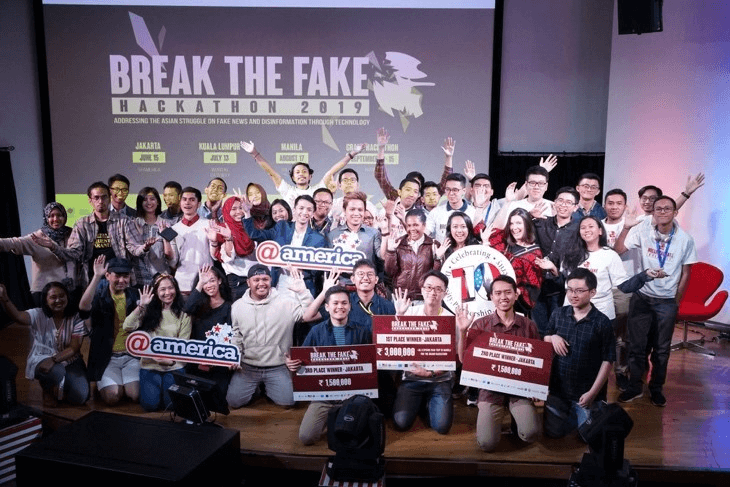UP, Ateneo, La Salle alumni trio wins Break the Fake Grand Hackathon with news sites tracer project
By: Angie Quadra-Balibay
|
Published on: October 25, 2019

Team Troglodyte, composed of Dominic Ligot of UP, Carlos Nazareno of Ateneo, and Nikko Torcita of DLSU represented the Philippines and bested the country champions of Indonesia and Malaysia. Credits to US Embassy in Manila.
Three friends who are graduates of the University of the Philippines (UP), Ateneo De Manila University (ADMU), and De La Salle University (DLSU) formed Team Troglodyte and went on to win the first-ever Break The Fake Grand Hackathon.
Team Troglodyte, composed of Dominic Ligot of UP, Carlos Nazareno of Ateneo, and Nikko Torcita of DLSU represented the Philippines and bested the country champions of Indonesia and Malaysia in competitions that pitted software developers and media and information literacy advocates in a series of Break The Fake hackathons that produced tech solutions to fight disinformation.
Team Philippines’ trio of a game developer (Nazareno), a businessman (Ligot), and engineer (Torcita), won with their Troglodyte Solution, a database that collects and analyzes connections between fake news sites for use by researchers, journalists, and ordinary citizens.
The UP-AdMU-DLSU team won the Manila leg of the hackathon in August, while their counterparts won in Jakarta and Kuala Lumpur.
The three-country champions competed in the Break The Fake Grand Hackathon held from September 13-15 in Manila, where the Philippines emerged Grand Champion and won the top prize of Php 100,000 along with opportunities to make their project a reality.
A total of 41 finalist teams participated from the three cities during the month-long online-to-offline hackathons composed of online incubation and virtual mentoring sessions.
“We have found some of the most brilliant ideas from the winning teams… The winning team from the Philippines created a system that maps networks of fake news websites spreading digital disinformation,” reports Young Southeast Asian Leaders Initiative (YSEALI), the organization that assisted hackathon organizer Break the Fake Movement with funding from the U.S. Department of State.
Team Troglodyte of the Philippines won against the Indonesia country champion that created a reference provider bot which provides relevant information pertaining to the content that is being spread in messaging app groups and Malaysia’s champion team that developed a social media that runs on NEM blockchain platform, allowing writers to post articles while upvoting, engaging or reviewing other posts.
The Break The Fake winning ideas will be implemented through ABS-CBN’s digital citizenship program called “Bayan Mo Ipatrol Mo,” Facebook Philippines, DevCon Philippines, MaGIC Cyberjaya, WORQ Community, and among other partner organizations.

Team Philippines emerged champions among 41 finalist teams that participated from the three countries during the month-long online-to-offline hackathons. Credits to YSEALI.
Businessman Dominic Ligot explained that their Troglodyte Solution addresses the fact that “People are not very good at detecting fake (news).”
He points out the connections between fake news sites with “Common owners, same hosts, same webmaster. If you have a fake news site and it’s connected to five others, there’s a high chance that those others are also compromised. We will receive all that data, store it, categorize it,” Ligot said.
Game Developer Carlo Nazareno noted how when he finished there were “around 60 international fake news websites combined and then 90 Filipino fake news websites. So I pitched this idea.”
“What if with this database you unravel a pattern and before they even post this fake news campaign, you’re able to deter and put preventive measures? That would weaken their activities,” Nazareno said.
Nazareno also shared that they plan to work with media and the academe to develop a Transparent Reputation Index for the database.
Engineer Nikko Torcita spoke of the value of their creation, saying, “We want it to be a tool that will ultimately really help… journalists, researchers, fact-checkers so that you never have to play catch up anymore.”
“It serves as a inspiration for people to come together and come up with ideas and solutions. It’s not about the prize money. It’s important that what we did, somebody does it, too. Maski ipamigay na naming yung idea, basta may gumawa kasi itong mga solution na ‘to, importanteng ma-implement sila (We can donate the idea to someone else as long as it gets made because it’s important that these solutions are implemented),” Nazareno concluded.
Gab Billones, the co-founder of Break the Fake Movement organizers, talked about the rationale for the competition. “Why not think about solutions that will limit the spread of fake news? In hackathons — developers, software engineers, designer — you gather them in one room, get them to think about solutions and give them a topic to think about. We have rich talent in the ASEAN region.”
This is not the first time for UP, Ateneo, and La Salle, top universities in world rankings, to work together in combating “fake news” disinformation. The three schools were in Tsek.Ph, a collaboration with the country’s top newsrooms for fact-checking of election-related information on media.
The Tsek.Ph project involved the newsrooms of ABSCBN News, Baguio Midland Courier, Central Luzon TV 36, DZUP 1602, Interaksyon, Minda News, Philippine Star, PhilStar Global, Vera Files, Probe, and Rappler whose chief Maria Ressa earlier this week received the Shorenstein Journalism Award from Stanford University.
SEND congratulations in the comments below to Team Philippines – Troglodyte from the UP, Ateneo, and La Salle for using their knowledge and skills to combat disinformation.
Like, Follow, Subscribe to GoodNewsPilipinas.com Facebook, Twitter, Instagram, Good News Pilipinas! TV on YouTube, new story notifications and e-mail newsletters for updates on more Filipino Pride stories.